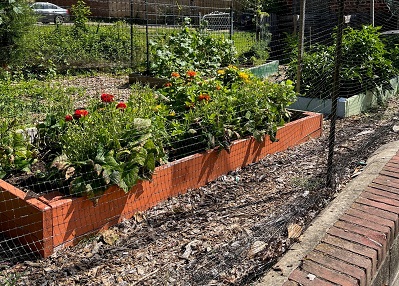
“Next, the angel showed me the river of the water of life, sparkling like crystal, flowing from the throne of God and of the Lamb. Between the main street and the river was the Tree of Life, producing twelve kinds of fruit—a different kind every month. And the leaves of the tree were for healing the nations. No longer will there be any curses.” – Revelation 22:1-3 CJB
In the Bible, gardens often symbolize abundance, beauty, and harmony, representing the perfect relationship between God and humanity. They remind us of God’s provision, care, and the importance of cultivating a deep connection with Him. When God planted a garden in Eden, it was the beginning of His love for creating spaces where He could intimately meet His people through plants.
I’ve come to see that the garden at Christ Lutheran Church (CLC) serves as a “public-facing ministry.” It’s more than just a place of beauty; it boldly declares that as God’s people, we are committed to connecting with our neighborhood and wider community through earth-keeping.
But how can a small church take on such a mighty task?
Let’s go back to the beginning. Before COVID, the idea of the CLC garden was a way to reach people where they were—in the community. A group of volunteers came together, building vegetable and flower boxes, seeding, composting, turning soil, and harvesting the bounty. This was how CLC ministered to the community, and over time, these efforts grew into a quiet “social movement.”
After speaking with members of the garden ministry, I learned that they’re thrilled to share vegetables with our CLC food pantry and Fellowship Baptist Church for their food bundles. Fellowship Baptist members deeply appreciate the fresh produce. The garden ministry is also providing food to those outside our congregation, like Partner Arms/Housing Up and other food beneficiaries.
Would we describe these activities as the building blocks of a movement? Maybe not at first glance. But as ministry members realized, these efforts have the potential to evolve into something greater—a social justice movement focused on education and advocacy.
So, what does it mean to be part of a social justice movement?
Social justice often refers to fairness and equity in social, political, and economic systems. It involves movements that seek inclusion, self-determination, and equity for marginalized populations. For our garden ministry, this translates into advocacy—especially for youth development and the broader community. They aim to educate the public about the harsh reality of food deserts, including those right here in Washington, D.C.
Food deserts—areas where access to healthy, affordable food is limited—are more common than you might think. In a wealthy nation like ours, food scarcity can be a source of shame, embarrassment, and anxiety for those affected. Many people struggle silently, unable to feed themselves or their families as inflation strains both rural and urban communities.
Our garden ministry seeks to address this pain, sharing food as a way to bring peace and healing to those in need. They want people to understand how food scarcity affects everyone, how climate change impacts farming, and how hunger creates feelings of shame. The ministry stands as quiet warriors, continuing the fight against food scarcity, using food as a tool for justice.
In a quiet but unwavering way, the garden ministry is asking an important question: How do we want to see this ministry grow? It’s a simple question, but the possibilities are vast. As a congregation, here are some things to reflect on:
– Do we want to expand the garden ministry to engage children, youth, and the community in Ward 4?
– Do we want to partner with another church to raise awareness about food scarcity in our city?
– Do we want to support national legislation, like changes to the Farm Bill, that address food insecurity?
There are many ways to expand this ministry. But the most important question is spiritual: As God’s people, do we want to continue breathing life into this ministry? For me, the answer is clear. But the ministry seeks your thoughts.
I’ll leave you with one of my favorite verses:
“Let us go early to the vineyards to see if the vines have budded, if their blossoms have opened, and if the pomegranates are in bloom—there I will give you my love.” – Song of Songs 7:12 NIV
Tony Holland-Buckley
